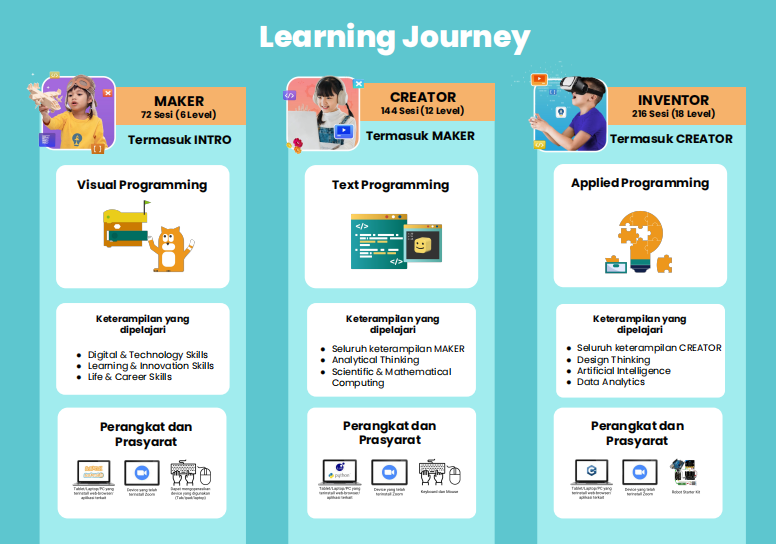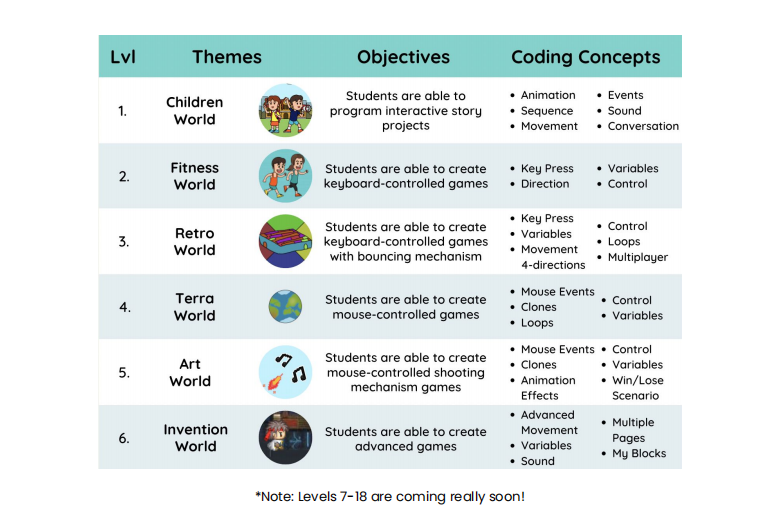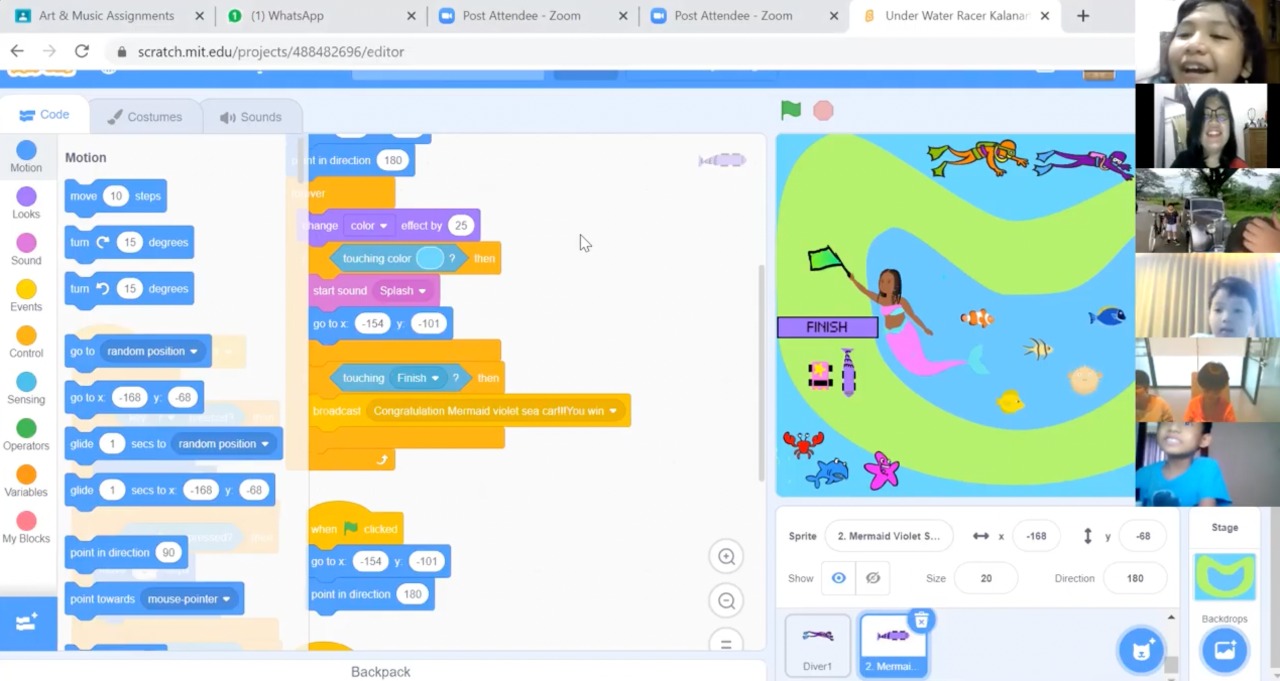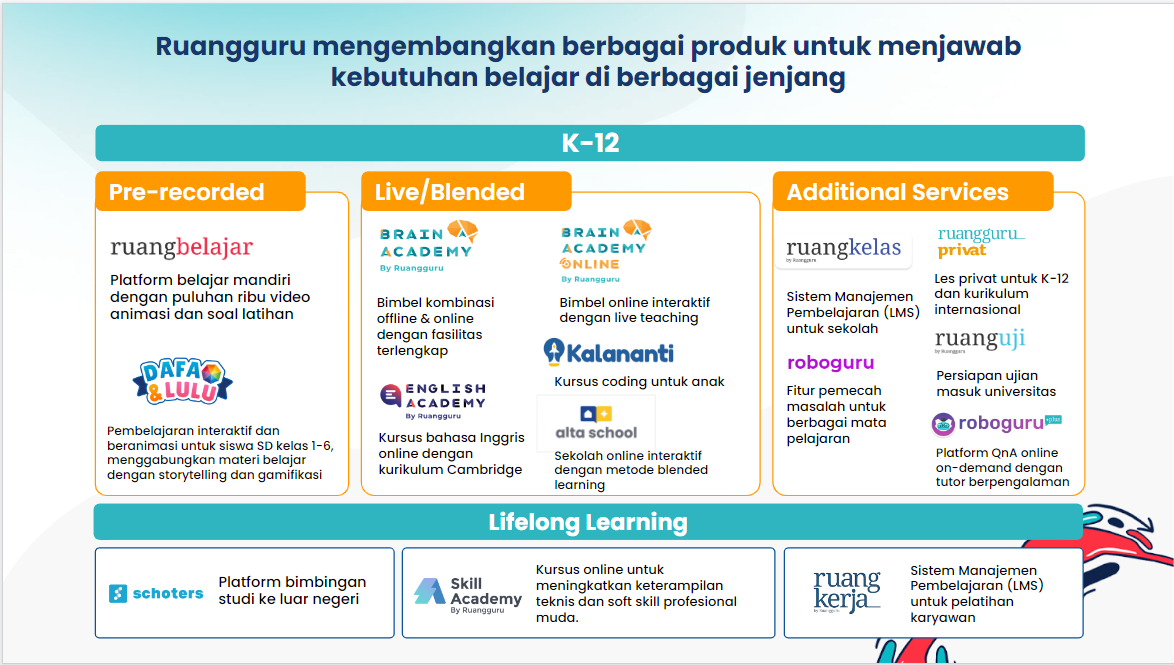How Kalananti Teaches Programming Languages in Fun for Kids
Kalananti was originally in the form of private tutoring started by Ahmad Syahid in 2015, eventually becoming an edtech startup in 2020 and acquired Ruangguru in March 2022
Long before Kalananti was acquired Ruangguru, Ahmad Syahid Zakaria (CEO of Kalananti) has a dream of starting his own business which he enjoys in the world of education. Syahid also founded a private tutoring business in 2015 which has been running successfully for almost three years, while completing college.
When compiling his thesis, he found knowledge which states that cognitive abilities have something to do with education and employment. This condition confirms that private tutoring is not a solution, because what he wants to pursue is exploring new learning methods.
Separately, quoting from a scientific journal compiled by Romer (1990) entitled "Endogenous technological change: Journal of Political Economy", there are several important aspects that contribute to growth, namely investment in human resources, innovation, and knowledge.
Human resources are closely related to education and living standards. At the individual level, investment in human capital (human capital) A country can be obtained by increasing the cognitive (intellectual potential) and non-cognitive (social and emotional) abilities of the people within it.
Furthermore, according to Olaniyan & Okemakinde (2008) in the journal "Human capital theory: Implications for educational development", cognitive skills are very necessary to increase a country's production capacity. Differences in economic growth between countries are closely related to cognitive skills as measured by international assessments (mathematics and science).
These cognitive skills can somewhat close the gap between developed and developing countries. Because in general there is a shortage of cognitive skills in developing countries because they prioritize quantity over quality of education.
“The problem is the relevance of the material and skills used. This idea gave birth to the Kalananti program which was still there at that time embedded in tutoring. Moment develop MVP, lots of fans. Then there are many of us trial and chat with parents to see in depth part from their point of view. "The parents are worried about what to provide for their children in the future," he said when contacted DailySocial.id.
The Kalananti program became more serious after Syahid graduated from college, together with his friends at Industrial Engineering, University of Indonesia who were equally interested in the world of education. Initially there were six people in Kalananti's team, like natural selection, four people remained. They are: Ghassani Shabrina (Head of BizOps), Aldeina Putriandita (Head of Academics), Fairuz Qalbi Andara (Head of Marketing), and Ahmad Syahid Zakaria (Headmaster/CEO).
Furthermore, starting from 2019 Kalananti slowly introduced the concept through weekend learning programs, after school, collaboration with brand and schools, until finally running completely online since the pandemic, to the point of view Ruangguru and later fully acquired in March 2022.
Kalananti's research process
At first it was a trip Kalananti based on thesis material which was then made into a scientific journal by Syahid. He conducted research in the field to gain perspective on how to develop learning media that can teach quite complex material to ordinary people. The focus taken is teaching design thinking which is in the corporation for children.
“It turns out that the experiment was successful because in several cases for framework di coding or Programming, it turns out that these things exist not for knowledge, but as mindset. At a minimum level, how are we able to teach mindsetit hasn't arrived yet hard skills. "
He continued, when canvassing apparently found that design thinking no need to have to go to the next level, ie entrepreneurship. But in the world entrepreneurship, there are other lessons that can be sorted into something thematic and can be taught to children.
Kalananti had to pivot three times until he finally found his MVP point. Initially Kalananti had three solutions once it stood alone as a startup EdTech, namely Kids Coder, Little Problem Solver, and Future Leader.
For Future Leader, the concept is similar to Kidzania, children are invited to simulate solving problems in the future with the profession they choose. This session runs smoothly offline and interactive because children are free to wear costumes, but they don't work effectively when worn.convert be online.
This condition happened to Kalananti when the pandemic occurred. Of the three solutions, only Kids Coder is maintained to date. Because, learning can be done completely online.
Previously, of the three solutions offered above, each was designed with children's needs in mind. For example, Kids Coder focuses on courses coding with a project-based approach, to introduce digital skills and technology by making digital creations.
Meanwhile, Little Problem Solver focuses on problem learning (PBL) to develop learning and innovation skills by completing case studies. Lastly, Future Leader is a character building program to train life and career skills using stimulating activities and a practical approach.
“When the program coding this is simulated to online, faster growth. Finally us pivot there. Within a year it grew five times, then at the beginning of 2022 it grew even faster after joining Ruangguru. "
Currently, of the three initial solutions offered, Kalananti is now only focusing on one area, namely coding to prepare children to become the next leaders of digital innovation (Future Digital Innovator). coding, according to Syahid, it is a tool to hone logical and logical skills problem solving. For example, when children discover bugs in the program he will be encouraged to identify problems and formulate solutions.
The education system in Kalananti, he continued, is built on three main foundations, namely skills, knowledge and 21st century character. The three of them were reduced to material and evaluative concepts, and then designed into a material learning journey. All of this learning is packaged through various types of exciting and interesting themes for children aged 6-12 who are the target students at Kalananti.
Education programs
In the details of the program at Kalananti, apart from coding, also hone future 4C skills (Communication, Collaboration, Critical Thinking, Creativity), and help build digital character and personality. In activity coding, Children will hone their computational thinking skills in understanding various basic programming concepts through tutorials, code experiments and activities unplugged.
Meanwhile, for innovation activities, children will develop their innovation skills in creating projects coding independently by doing ideation, and implement it. All teaching and learning activities at Kalananti are through classes online which is direct (live classes) held by the teacher.
Different with EdTech others who use it pre-recorded, according to Syahid, a learning process coding requires interaction, the tutorial cannot be done independently by the child. "In coding there it is debugging, from all directions coding given, it definitely doesn't always run smoothly. This requires direct interaction between students and teachers.”
Kalananti provides two types of classes for children, namely courses and bootcamp (short courses). For the course, children will learn to explore concepts Programming and problem solving, the duration is longer with up to 18 tiered levels, divided into three types of levels: Maker, Creator, and Inventor. The higher the level, the more study sessions that must be completed.
For example, for a Maker studying Visual Programming, it requires 72 meeting sessions consisting of six levels. The skills to be learned are Digital & Technology Skills, Learning & Innovation Skills, and Life & Career Skills.
“The first six levels are learning questions fundamentals, then the next six levels of questions programming tasks, and finally the application, you can go to robotic or so on. This third phase is aimed at creating real work. "These three phases are provided because not all children want hard skills, but today's children have been interested in digital since childhood, but need to be facilitated."
The device required is an installed tablet/laptop/PC Web Browser/related applications, Zoom, and can operate the device used. Class live will be held once a week, students can access additional material outside of class and class documentation. Then, you will receive a certificate and a report on your child's progress at each level increase.
Meanwhile at Bootcamp, there are three activities that will be carried out: Game Coding Bootcamp (making games), Future Jobs Bootcamp (introducing future ideals), and Holiday Bootcamp. In this program, children can explore various new skills. In Future Jobs, for example, children are invited to study and carry out STEAM (Science, Technology, Engineering, Art and Mathematics) based job simulations which are predicted to become job trends in the future.
Syahid explained that the metrics to be achieved from all learning materials taught in stages, namely knowledge, skills and character. This knowledge talks about learning Programming from basic concepts, then skills, not just talking about things coding tapi skill technology and how to think logically. Finally, how to talk about using technology to cope hoax etc.
As for evaluating output From children's learning outcomes, Kalananti uses a 4 level evaluation model training by Kirkpatrick: Reaction, Learning, Behavior, and Results. But in Kalananti we only use the top three levels, Results are not included. "For Reaction, we measure the daily reactions of children to their teachers, so there is a rating with the highest scale being 5. Are they happy during class. So that's all feedback We take this in a qualitative way."
More Coverage:
Meanwhile, for the Behavior level, it challenges children to be able to create a game from scratch based on learning plans presented in class. Because Kalananti teaches concepts design thinking, do not use tutorial learning which only has a short-term impact on whether children can do their assignments smoothly.
“If it's a tutorial, that's it short term, children only remember the sequence when told to repeat it in the same game context. But we teach starting from the concept and nature project-based, starting from zero you will get used to it. Because what we can control from the child is whether the concept is correct or not."
It is claimed that in 2020 since completely pivoting to digital, Kalananti has been trusted by more than 3 thousand parents to educate their children. This figure was achieved within two years, before it was officially acquired Ruangguru. The growth of Kalananti users immediately soared, in June 2022 alone there were 500 new students added.
“We want to continue to grow and do a lot of innovation together Ruangguru, including improving quality and assessment which we will overhaul again. Teachers at Ruangguru "We will also be trained to be able to teach Kalananti coding classes, so they can be skilled in many things."
To attract more users, he also emphasized affordable learning costs for parents. Syahid reasoned, because currently there is a need for learning coding still tertiary in nature, on the other hand this expertise will be needed in the future so access needs to be made easier.
Together Ruangguru, now Kalananti has adequate human resource reinforcements from previously only 10 people to explore the next plan. Syahid said that his party wants to continue to explore programming languages to make them more friendly to the ears of Indonesians. Because, in the future this language will become a new language that competes with English because of the increasingly close relationship between humans and technology in everyday life.
"Because the material in Kalananti does not yet cover 10% of all programming languages. We have many plans to do this, for example holding bootcamp on a monthly basis to facilitate parents greatly commits with Kalananti," he concluded.
Sign up for our
newsletter
 Premium
Premium




